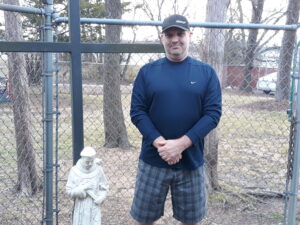 Chris Prothro grew up in El Dorado, Arkansas and joined the Army right after high school. He served from 1994 until 2000. “I had a half tuition scholarship for baseball at ASU, but I wanted to test myself, do something that required more discipline. I hadn’t told anyone, I was quiet about it. When I told my parents, my dad just started laughing. But they supported me all the way.”
Chris Prothro grew up in El Dorado, Arkansas and joined the Army right after high school. He served from 1994 until 2000. “I had a half tuition scholarship for baseball at ASU, but I wanted to test myself, do something that required more discipline. I hadn’t told anyone, I was quiet about it. When I told my parents, my dad just started laughing. But they supported me all the way.”
Mr. Prothro served in the infantry as an air assault mortar-man. He trained at Fort Benning and Fort Hood, then served at Guantanamo Bay and finally, Korea. “We were close to the border, a little over three miles away.”
After the military, Mr. Prothro went to Louisiana Tech and was certified as a medical technician. He worked both as an emergency room technician and a lab technician. He married a girlfriend from high school and they had a son.
But dealing with PTSD and then the loss of a job and resulting financial issues, cost Mr. Prothro his sobriety. “It was during COVID, my boss died and there was no one to take over the clinic. My wife was dealing with her own, different addictions and we separated. I got into legal problems and was court-ordered into a rehabilitation program. “It was God-sent, but like the judge said,’you may not like it, but you’ll thank me in the long run.’ And he was right. I began getting sober and I’m a better man now then I was two years ago.”
When he was ready to discharge, Mr. Prothro didn’t know of any options. “My caseworker said she knew a place, called the Day Treatment Center and got me into St. Francis House. It’s been the best decision of my life.”
Mr. Prothro is currently working on his medical claims and is a Veteran Representative at St. Francis House. He has a voucher for housing in a near by town and has reconnected with a younger brother who will be moving there to join him. “The most important thing is that I’m working my 12-Step program. And I’ve reconnected with my son. He’s ten years old and is ‘ready to see his daddy’.”
“I read something that I’m trying to practice because it made a lot of sense to me. It’s from Thomas à Kempis’s book The Imitation of Christ. “To give all for all, ask nothing, demand nothing in return.’ I just want to say that the people here are really wonderful. And to thank everyone who donates, gives their time, everything you give to us. Words cannot express how much you are helping me be a better person.”